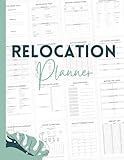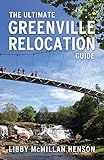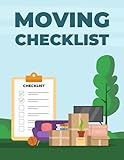Best Tips to Choose Virginia Over Virginia to Buy in November 2025

Strategic Relocation, North American Guide to Safe Places, Fourth Edition



My Moving Planner: Plan your move step-by-step with checklists, trackers, guides, and more!



Moving Made Simple: A Complete Relocation Planner



How to Move to Canada: A Discontented American's Guide to Canadian Relocation



Strategic Relocation: North American Guide to Safe Places, 3rd Edition
- EXPANDED THREAT ANALYSIS FOR NORTH AMERICA AND OVERSEAS TAX HAVENS.
- OVER 200 PAGES OF DETAILED INSIGHTS ON US STATES AND CANADIAN REGIONS.
- STUNNING MAPS HIGHLIGHT RISKS AND RECOMMENDED RELOCATION AREAS.



The Ultimate Greenville Relocation Guide



Moving Checklist: Guided Moving Planner Worksheets / Book To Prepare Moving and Packing Supplies, Accessories and Essentials / Moving To A New Home or ... Blue Matte Cover - 8.5" x 11" / 90 Pages



Organizing Your Move: Moving Checklists, Worksheets and Timeline



THE SMOOTH MOVE - WORKBOOK: Comprehensive Checklists, Inventory Trackers, Decluttering Tips for a Stress-Free Relocation (Simply Sorted Life Series)


Both states, Virginia and Virginia, refer to the same place, which might be a mistake or a misunderstanding. It is essential to clarify the context to provide accurate information. If you are referring to Virginia and another state, please provide the name of the second state to compare and provide relevant details about the factors that are important to you for relocation.
How to find affordable housing in Virginia and Virginia?
To find affordable housing in Virginia, you can follow these steps:
- Determine your budget: Before starting your search, evaluate your income and expenses to determine how much you can afford to spend on housing. Experts recommend spending no more than 30% of your income on housing.
- Explore affordable housing programs: Virginia offers various affordable housing programs and resources. Visit the Virginia Housing Development Authority (VHDA) website (www.vhda.com) to learn about programs like the Low-Income Housing Tax Credit, Rental Assistance, and Homeownership programs. VHDA can connect you with affordable housing options and provide guidance on eligibility and applications.
- Check with local housing authorities: Contact the local housing authorities in the cities or counties you are interested in residing. They often manage public housing programs and can provide information about subsidized housing options.
- Utilize online search platforms: Websites like Zillow, Rent.com, or Apartments.com can help you find affordable housing options in Virginia. Use filters to narrow down your search based on your budget, location preferences, and other criteria.
- Connect with nonprofit organizations: Nonprofit organizations such as Habitat for Humanity, local Community Development Corporations, or Rebuilding Together provide resources for affordable housing in Virginia. They often offer affordable housing opportunities or can guide you towards available options.
- Consider shared housing or roommates: Sharing a living space can significantly reduce housing expenses. Look for apartment listings, consider renting a room in a shared house, or seek potential roommates through online platforms like Craigslist or Roommates.com.
- Network and ask for recommendations: Inform friends, family, and colleagues about your housing search in Virginia. They might have leads or connections to affordable housing options.
- Stay updated on rental listings: Regularly check local classified ads, community bulletin boards, or university housing resources for rental opportunities. These sources might advertise reasonably priced housing options.
- Sign up for Section 8 Housing Choice Voucher Program: If you meet the eligibility criteria, you can apply for the Section 8 program, which helps low-income individuals and families afford housing in the private market. Contact your local Public Housing Authority to learn more and apply.
Remember, affordable housing availability can be competitive, so act promptly when you come across suitable options.
How to research the availability and accessibility of healthcare facilities in Virginia and Virginia?
To research the availability and accessibility of healthcare facilities in Virginia, you can follow these steps:
- Use online resources: Start by using online resources like search engines, healthcare provider directories, and government websites. These sources often provide information about the healthcare facilities available in different counties or cities in Virginia. Some useful websites include:
- Virginia Department of Health: The official website of the Virginia Department of Health offers information on healthcare facilities, health services, and resources available in the state.
- American Hospital Directory: This online directory provides a comprehensive list of hospitals in Virginia, along with contact information, services offered, and other relevant details.
- Healthgrades: Healthgrades is a website that allows you to search for healthcare providers, hospitals, and other medical facilities in Virginia. It provides ratings, patient reviews, and quality information about the listed facilities.
- Contact local health departments: Reach out to the local health departments of the city or county you are interested in. They can provide information about the availability of healthcare facilities, clinics, and community health centers in the specific area.
- Utilize Virginia Health Information (VHI): VHI is a non-profit organization that aims to inform and educate Virginians about healthcare. They provide resources, data, and tools to help you research and compare healthcare facilities based on quality, costs, and performance. Their website can be a valuable resource when researching healthcare options in Virginia.
- Consult insurance providers: If you have health insurance, contact your insurance provider for a list of in-network healthcare facilities and providers near your location. They can guide you to the facilities that accept your insurance plan, which may help in ensuring affordability and accessibility.
- Check with local community organizations or advocacy groups: Local community organizations or advocacy groups focused on healthcare or public health may have information or resources related to healthcare facilities in Virginia. They can provide valuable insights, especially if you have specific healthcare needs or preferences.
- Consider geographical proximity and transportation: Assess the proximity and transportation options to the healthcare facilities you are interested in. Accessibility can be influenced by the availability of public transportation or proximity to major roads. Consider your own transportation options and any potential obstacles that might affect your ability to reach healthcare facilities conveniently.
Remember to fact-check the information you collect, as healthcare facility availability and accessibility can change over time. It's a good idea to update your research periodically to ensure you have the most accurate and up-to-date information on hand.
How to understand the demographic composition of Virginia and Virginia?
To understand the demographic composition of Virginia, you can gather information from various sources, including census data, government reports, and reputable websites. Here are some steps to help you accomplish that:
- Consult the U.S. Census Bureau: The Census Bureau provides detailed demographic information through their website. You can access data on population, race, age, ethnicity, income, education, and more. Start by visiting the official Census Bureau website and using their search tool to find data specific to Virginia.
- Analyze Census Reports: Look for reports and publications released by the Census Bureau that focus on Virginia. These reports often provide an in-depth analysis of demographic trends, including changes over time. Examples of relevant reports include the American Community Survey, State and County QuickFacts, or the decennial census.
- Explore State Government Resources: The official website of the Commonwealth of Virginia may also offer valuable demographic information. Check if the state government's website has census-related reports or other sources that provide demographic insights specific to Virginia. State agencies may publish their own data sets or analyses.
- Review Local Government Information: Many localities within Virginia also publish demographic information on their websites. Look for city or county government websites and search for any reports or data they provide. This can give you a more detailed understanding of specific regions within the state.
- Use Reputable Websites: Trusted websites like the Pew Research Center, the United States Census Bureau's Factfinder, or the Weldon Cooper Center for Public Service at the University of Virginia often provide comprehensive and reliable demographic information. They analyze data from multiple sources and present it in a user-friendly format.
- Cross-Reference Multiple Sources: When analyzing demographic data, it's essential to cross-reference multiple sources to ensure accuracy and reliability. Different sources may present data differently or use different methodologies, so comparing and verifying the information is crucial.
By following these steps and leveraging available resources, you can gain a comprehensive understanding of the demographic composition of Virginia.
